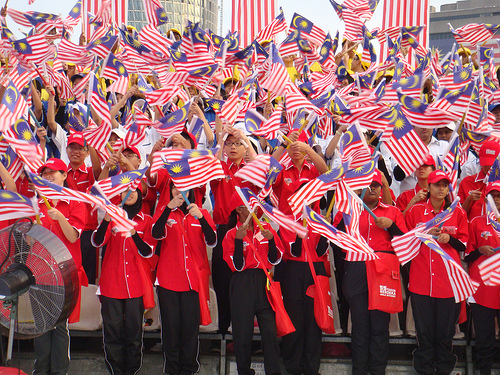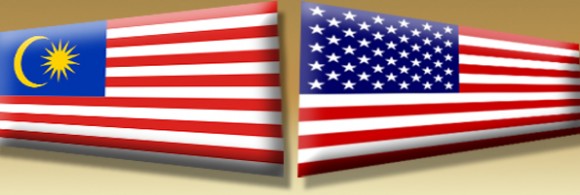THERE has been an unusual amount of bickering over the Merdeka celebrations this year. There have been public disagreements over the Merdeka theme, song and logo, and over the celebrations that have been held, plus who should be invited.
There were the federal government-organised Merdeka celebrations at Bukit Jalil and the countdown at Kuala Lumpur City Centre, and the Pakatan Rakyat state government celebrations. There was also Janji Demokrasi, organised by civil society, at Dataran Merdeka. Individuals, including a teenager, have even been arrested, handcuffed and expelled from school over their behaviour at the non-government Merdeka celebrations.
The Nut Graph speaks to political scientist Wong Chin Huat on the different celebrations of Merdeka and tries to pin down why this year’s celebration is more contested than in other years.

TNG: Why the tussle over Merdeka this year? Has it been this way before? What’s different this time round?
This is not the first time the official celebration of Merdeka and/or Malaysia Day has been contested. In 2008, some bloggers posted the national flag upside down to drive home the message of “nation in distress”. In 2009, after the Perak coup, Teoh Beng Hock’s death and the cow-head protest, some citizens called for a black Merdeka celebration. In 2010, on the eve of Malaysia Day, instead of having a loud countdown, concerned citizens organised “47 minutes of silence”, a celebration to usher in Malaysia’s 48th year as a country and reflect on what Malaysia was meant to be – a promise of fraternity through freedom.
These were, however, mostly small-scale gatherings and expressions. What makes this year’s state-citizen contestation more pronounced than before is the Barisan Nasional (BN) coalition’s desperate move to push its electoral campaign into the Merdeka celebration by using “Janji Ditepati” – a self-praise slogan. Many Malaysians can no longer stomach such self-serving behaviour especially after their “baptism of fire” in the Bersih 2.0 and 3.0 rallies. This is something the BN government cannot or refuses to acknowledge.
In the past, most people seem to have been happy to enjoy their public holiday or watch the Merdeka parade on television. This year, people have taken to the streets for their own Merdeka celebrations, ignoring or even mocking the government-organised celebrations. Why do you think this was the case?
The fact that Merdeka and Malaysia Day are no longer just official rituals speaks volumes of the rise of citizens. They want to reclaim the country. They are not satisfied to be pushed around by politicians, bureaucrats and the police after paying taxes. They are putting their feet down and telling the state: “Hey, look. Who’s the boss here?”
Prime Minister Datuk Seri Najib Razak reportedly described the roughly 100,000-strong crowd at the government-organised Bukit Jalil celebration as the “majority … who are nation-loving citizens”. Are those who snubbed the government celebrations then nation-hating citizens?

It appears that “Najib the Moderate” has not read Thomas Paine, who said: “The duty of a patriot is to protect his country from its government.” Or Mark Twain, who said: “Patriotism is supporting your country all the time and your government when it deserves it.”
The test of democracy is about living with people you don’t like. State officials who cannot see themselves as serving the entire country should return the portion of their salaries that come from those who oppose or are critical of them. That would simply be the honest thing to do.
For me, which celebration people join, whether with national laureate Pak Samad (A Samad Said) or with Najib and Datin Seri Rosmah Mansor, speaks not of patriotism but preference. Personally, I am very glad that all my friends have the preference they have and were not attracted by the food or the fanfare in Bukit Jalil.
What do you make of the hostile responses to the flying of the flag now identified as the Sang Saka Malaya?
Many of the BN’s critics, especially left-leaning ones, question Malaysia’s flag and national anthem and consider them copycat products. Negaraku’s tune is said to have originated from Terang Bulan, a Malay-Indonesian love song that possibly evolved from La Rosalie, a popular French song. The Malaysian flag, now branded Jalur Gemilang, is also belittled by some for being similar to that of the American flag. Hence, in these critic’s eyes, it has a whiff of colonialism about it.

The criticisms and ridicule surrounding the anthem and the flag signal a rejection of the Umno-centric discourse of national history. Through the heavily partisan and distorted history curriculum in national education, Umno tries to brainwash Malaysians to believe that Umno was the sole founder of the nation state, and hence the natural ruling party. Not only are the Borneo and non-Malay parts of our national psyche heavily suppressed, so, too, are parts of Malay nationalism.
Umno is portrayed as the independence struggle’s flag bearer. But the party was, in fact, a party controlled by Anglophile aristocrats and bureaucrats collaborating with the British to suppress the more proletariat, pro-Indonesia Malay radicals.

The raising of the modified Sang Saka Malaya flag should be seen in the same context as Fahmi Reza’s documentary 10 Tahun Sebelum Merdeka. These are initiatives and attempts to tell us the other sides or perspectives of our national history. You need not agree with them, but we must respect their right to express these perspectives as counter-mainstream as they may be.
The Sang Saka Malaya recalls the struggle of Malay leaders for independence through Melayu Raya, which was a combining of Malaya with Indonesia. I, for one, am grateful that “Project Malaysia” survived the Indonesia-Malaysia confrontation. In hindsight, I am glad that the leftists’ ambition for Malaya to become part of Indonesia failed. For when Sukarno lost power to Suharto in 1965, some 1.3 million suspected communists and sympathisers were killed in the post-Sukarno period.
Malaysia from October 1965 to May 1998 was a freer and better place than Indonesia under Suharto’s New Order. Hence, for me, it is of no greater value for our flag to resemble the red-white Indonesian flag than the striped American one.
Additionally, I would object to any proposal to change the national anthem and national flag, for they represent continuity. This sense of continuity is extremely important to supporters of the BN regime at this juncture in time. They must be assured that the country remains the same even if the government is changed and that they won’t become second-class citizens. A complete break with our past does not augur well for our future.
I would, however, not support any legal action against the proposal or promotion of a new flag or anthem. For me, the Malaysian flag and anthem represent freedom, the very and only reason why we celebrate or should celebrate independence. To “protect” the national flag and anthem by curbing freedom is actually an insult to these symbols, and a negation of our independence. ![]()
Wong Chin Huat is a political scientist by training and was a journalism lecturer prior to joining the Penang Institute, a Penang government think tank. If readers have questions and issues they would like Wong to respond to, they are welcome to e-mail editor@thenutgraph.com for our consideration.
Read previous Uncommon Sense columns
[related-posts]


onemalaysian says
BN is a party that works on patronage and has lost its way in the last 55 years in power by forgetting that its primary role is to listen and serve the rakyat. Just look at the current states where BN are the opposition, they are like chickens without heads and cannot provide any positive arguments or improvements for the state.
There is a lack of new blood in BN and this will lead to its downfall. Dr M is “spot-on” when he claimed that once PR wins it will be difficult for BN to win again – this is a fact as the rakyat sees the improvement and transparency in PR’s running of Penang and Selangor state governments from deficits to surplus.
AntiPASti says
The pro-Opposition groups in Malaysia are like the Republicans in the US. They want government to be as small as possible because they inherently distrust the government and they want to further the agenda of the minority.
Just like the US Republicans, DAP supporters hate redistributionist policies such as affirmative action. Just like the US Republicans, PAS wants religion to infiltrate government. Just like the US Republicans, PKR is led by a man who is a political chameleon.
Gopal Raj Kumar says
Dear AntiPASti,
I could not have said it better myself. A very, very appropriate comment. It is a wonder that a “free speech, democracy-” loving publication like The Nut Graph actually published your comment.
stewoolf says
I appreciate your comment very much! Indeed my concern is that not many who agree with you, read TNG. I believe an overwhelming number of the minority supports affirmative action. They are just opposed to the Bumis who enrich themselves on that pre-text. The size of government is not the issue. Its effectiveness is. I and an overwhelming number of those in the Chinese community strongly believe that clinging on to Islam and “Ketuanan Melayu” are NOT the solutions to the Malay dilemma. The solution lies in the Malay culture.
For example, children should be encouraged to express themselves instead of swallowing their parents’ expressions wholesale. “Mat rempit-ing” with accumulated rage makes situations worse. So do forum crashing, cow-head parading, etc. Butt exercises don’t help either. A fine example would be how Dr Mahathir put up his arguments and how Anwar Ibrahim rallies his cause.
So, express your opinion against mine. Not like ariticles in the Malay MSM with hollow rhetoric and irrational logic. The point is: how to implement affirmative action effectively that one day these measures would no longer be needed and be FAIR to the Malay masses AND the minorities.
Pratamad says
Thanks for your *entertaining* comment, one that is so narrow and reflective of the MSM’s successful twisting of truth. Do read TNG, Mkini and TMI more often to hopefully get rid of your [current] mindset. For the record, Pakatan as a whole does not hate redistributionist policies. It just wants them to be rectified to be people-oriented, need-based and colour-blind. In short, to modernise Malaysia’s policies and stop the abuses of [past] decades.
Kong Kek Kuat says
Unfortunately, not all the citizens have risen – intellectually. Some citizens actually have nothing to do (a hundred ringgits’ bet that it´s due to unemployment) but wonder why “a free speech, democracy-loving publication like The Nut Graph” would publish negative comments about the Opposition. Talk about wondering why humans would rather have naii (sic) as pets.